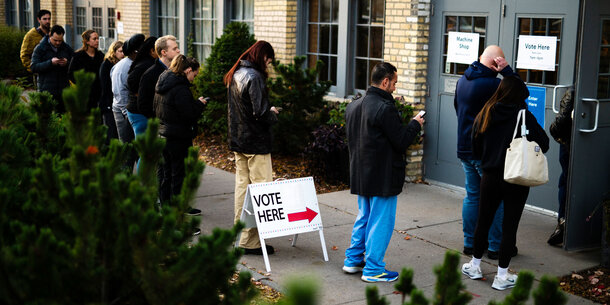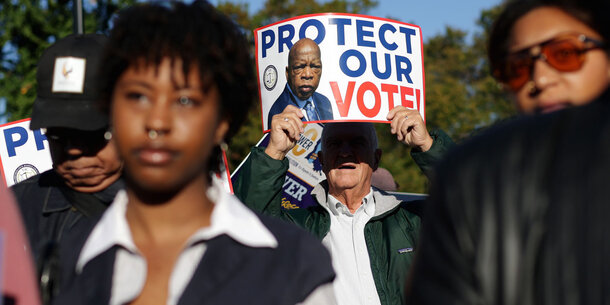Maps violate the Ohio constitution’s prohibition on partisan gerrymandering, would entrench a GOP supermajority in the state legislature
For Immediate Release
September 27, 2021
Contact:
Brennan Center for Justice: Mia Navarro, mireya.navarro@nyu.edu, 646–925–8760
CAIR-Ohio: Tala Dahbour, tdahbour@cair.com, 614–401–2920
Ohio Environmental Council: Emily Bacha, ebacha@theoec.org, 614–487–5837
Ohio Organizing Collaborative: Maki Somosot, maki@ohorganizing.org, 720–487–6632
Reed Smith: Jamie Moss, jamie@newspros.com, 201–788–0142
This afternoon, three Ohio civic organizations and six individual Ohioans filed suit in the Supreme Court of Ohio, seeking to block the state general assembly plan adopted by the Ohio Redistricting Commission on September 16 and require the commission to draw new districts. The plaintiffs argue that the new plan’s maps violate the prohibition against partisan gerrymandering and voters’ equal protection and associational rights under the Ohio constitution.
“These maps should not be allowed to exist. Six years ago, Ohioans from every party and every county voted overwhelmingly to ban partisan gerrymandering in our state to stop maps like this from hoarding political power against the will of the people,” said Pierette “Petee” Talley, one of the named plaintiffs in The Ohio Organizing Collaborative v. Ohio Redistricting Commission. “If the maps remain in place, millions of Ohioans, particularly Black Ohioans and other people of color who live in these gerrymandered communities like Toledo, won’t have a voice in any policies impacting their lives that come out of the Columbus statehouse.”
Represented by the Brennan Center for Justice at NYU Law and Reed Smith, the plaintiffs assert that the new maps would all but guarantee the GOP veto-proof supermajorities in both houses of the legislature, in contrast with the Republicans’ share of the vote in statewide and federal elections over the past decade — 54 percent.
The maps achieve this by “cracking” and “packing” Democratic-leaning voters: in some places, the state’s Democratic-leaning voters are split up or “cracked” between districts to make them less likely to win elections, while in others, Democratic-leaning voters are crammed or “packed” into a few districts to minimize the number of districts where they might win. Many of Ohio’s Black and Muslim residents are concentrated in gerrymandered districts, which would leave them with less power in the political system.
“Ohio’s general assembly should fully represent Ohio’s Black and brown communities, not serve as a power trip for one political party,” said Jeniece Brock, policy and advocacy director of the Ohio Organizing Collaborative, a plaintiff in the lawsuit. “We need a representative and responsive government that hears our communities’ voices on everything from access to health care, to student debt, to food and housing security. The maps from the redistricting commission essentially ensure that communities of color in Ohio, like mine in Akron, will not have enough seats at the table to be heard.”
In November 2015, more than 71 percent of Ohioans voted to endpartisan gerrymandering and institute a redistricting process that would guarantee that no district plan for the Ohio General Assembly would be drawn to favor or disfavor a political party. That ballot proposal amended Article XI of the Ohio constitution.
“Ohioans don’t merely recognize the importance of redistricting. They voted to clean it up and make it serve its intended purpose: fair representation for all,” said Alicia Bannon, managing director of the Democracy Program at the Brennan Center for Justice. “Not only did the commission fail to abide by the voters’ will, it did exactly what voters rejected. By subverting the democratic process, the commission created distorted and illegal maps that will harm Ohio’s voters and especially voters of color.”
The plaintiffs in The Ohio Organizing Collaborative v. Ohio Redistricting Commission include: Ohio Organizing Collaborative, CAIR-Ohio, Ohio Environmental Council, Ahmad Aboukar, Crystal Bryant, Samuel Gresham Jr., Prentiss Haney, Mikayla Lee, and Pierrette “Petee” Talley.
The complaint and more information about the lawsuit can be found here.
Additional comments from plaintiffs and co-counsel:
“The gerrymandered maps unconstitutionally dilute the political power of the Ohio Muslim community by splitting up the Muslim community in multiple cities across Ohio. As a civil rights and advocacy organization that seeks to empower Ohio Muslims and other marginalized groups through civic engagement efforts, we are bringing this lawsuit to ensure that the maps fairly represent the diversity in Ohio.” — Tala Dahbour, Policy Director, CAIR-Ohio
“To ensure a healthy environment for all who call Ohio home, we need a healthy democracy. As Ohioans already face the impacts of climate change, we need a functioning state legislature responsive to the needs of the people, not partisan or corporate interests. Everyone knows unconstitutional and gerrymandered state legislative district maps are a clear indication of an unhealthy democracy. The maps approved by the Ohio Redistricting Commission completely disregard the constitutional requirement for proportional representation and partisan fairness. As a result, the gerrymandered maps are a slap in the face to voters, and they will make it more difficult for Ohioans to combat environmental injustice. The OEC is honored to join this lawsuit, fight against these unfair maps, and advocate for what Ohioans deserve from their state legislature.” — Heather Taylor-Miesle, Executive Director, Ohio Environmental Council (OEC)
“The Ohio commission drew the lines to give one political party more than its fair share of representation, and its unconstitutional gerrymander required this lawsuit.” — Brian Sutherland, a partner at Reed Smith
“As a Dayton native and current resident of Cincinnati, I am personally familiar with the harmful impact of gerrymandering on my own community. The Black communities in Dayton and Cincinnati — two of the most gerrymandered cities in the state — have been perpetually under-resourced and undervalued. We’re demanding better for all Ohioans — whether Black, white, or brown, native or newcomer — and pushing for fair and equal political representation so all our voices can be heard.” — Prentiss Haney, Cincinnati

